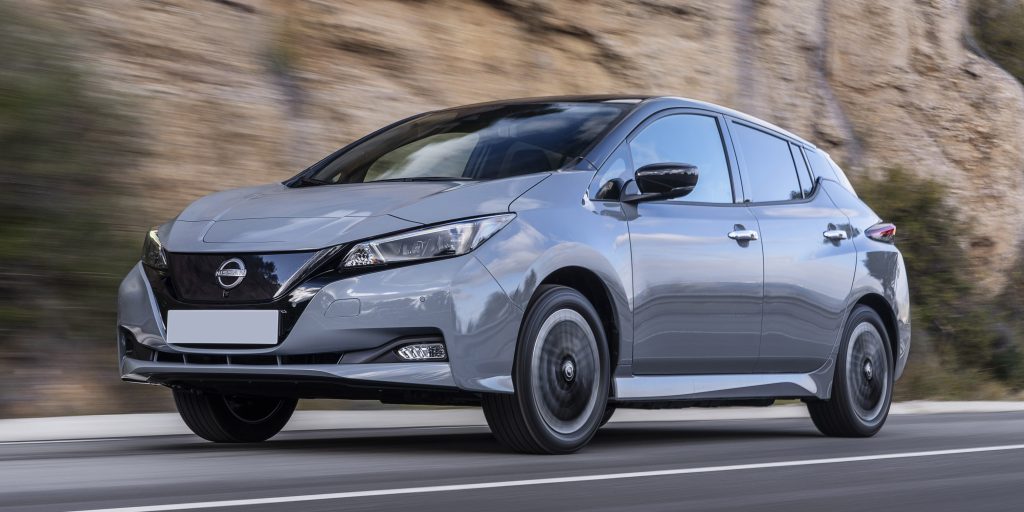The Nissan Leaf
Table of Contents
The Nissan Leaf, first introduced in 2010, is a trailblazing electric vehicle (EV) that has become an iconic symbol of sustainable transportation. As one of the world’s best-selling EVs, the Nissan Leaf has not only propelled the electric mobility revolution but has also garnered accolades for its performance, range, and innovative features. In this article, we will explore the various aspects that make the Nissan Leaf a standout option for eco-conscious drivers.

Design and Performance:
The Nissan Leaf boasts a sleek and modern design that combines aerodynamics with a distinct appearance. Its streamlined shape optimizes efficiency, while the iconic V-Motion grille and boomerang-inspired headlights give it a distinctive presence on the road. The latest models of the Leaf offer a more refined interior, ample cargo space, and comfortable seating for five passengers.
In terms of performance, the Leaf offers a smooth and responsive driving experience. The electric motor delivers instant torque, providing excellent acceleration from a standstill. The vehicle’s low center of gravity enhances stability and handling, making it an enjoyable car to drive in urban and suburban environments
Electric Range and Charging:
One of the primary concerns for EV owners is the range that a vehicle can cover on a single charge. The Nissan Leaf addresses this with an increasing range capacity in its newer models. The latest iteration of the Leaf, as of my knowledge cutoff in September 2021, provides an estimated range of up to 226 miles (364 kilometers) on a fully charged battery, depending on driving conditions and usage.
Charging the Leaf is convenient and accessible. It supports various charging options, including Level 1 charging using a standard 120-volt outlet, Level 2 charging using a 240-volt home or public charging station, and Level 3 fast charging at select public charging stations. Fast charging can provide approximately 80% of the battery capacity in around 40-60 minutes, while Level 2 charging takes several hours for a full charge.
Battery Technology and Efficiency
The Nissan Leaf features advanced lithium-ion battery technology, designed to deliver improved energy density and longer battery life. The vehicle’s battery pack can be charged to 80% in approximately 40-60 minutes using fast-charging stations. Additionally, the Leaf incorporates regenerative braking, which captures kinetic energy during deceleration and braking, converting it into electric energy to recharge the battery and enhance overall efficiency.
Eco-Friendly Features:
With zero tailpipe emissions, the Nissan Leaf is an eco-friendly transportation solution that helps reduce carbon footprints. By transitioning from conventional vehicles to the Leaf, drivers can significantly contribute to the reduction of greenhouse gas emissions and air pollution.
Safety and Technology:
The Nissan Leaf incorporates a range of safety features to provide peace of mind for its occupants. Some notable safety features include intelligent forward-collision warning, automatic emergency braking, blind-spot warning, rear cross-traffic alert, and intelligent around-view monitor. These technologies help prevent accidents and mitigate the severity of potential collisions.
In terms of technology, the Leaf offers a user-friendly infotainment system, complete with a touchscreen display, navigation, smartphone integration, and voice recognition. The latest models also support advanced driver-assistance systems, such as ProPILOT Assist, which combines adaptive cruise control with lane-keeping assist to provide semi-autonomous driving capabilities.
Cost of Ownership and Incentives:
While the initial purchase price of an EV may be higher than that of a conventional vehicle, the Nissan Leaf offers long-term cost savings. With fewer moving parts and reduced reliance on fossil fuels, EVs generally have lower maintenance and operational costs over time. Furthermore, governments and local authorities in many regions offer incentives and tax credits to promote the adoption ofelectric vehicles, which can help offset the purchase price and make owning a Nissan Leaf even more economical
Issues with The Nissan Leaf
Limited Range: While the range of the Nissan Leaf has improved over the years, early models had a more limited range, often causing “range anxiety” for drivers. While the newer models offer better range, it is still important for potential owners to consider their driving habits and ensure that the available range meets their needs.
Battery Degradation: Some Nissan Leaf owners have reported concerns about battery degradation over time. Like other electric vehicles, the capacity of the battery can decrease gradually, resulting in reduced driving range. However, it is worth noting that Nissan has made improvements to the battery technology in newer models to address this issue.
Charging Infrastructure: Although the charging infrastructure for electric vehicles has been expanding rapidly, it can still be a challenge in certain areas. Some Nissan Leaf owners have faced difficulties finding reliable charging stations, especially for long-distance travel or in regions with limited charging infrastructure. However, the situation continues to improve with the increasing availability of charging stations.
Rapid Charging Speeds: While the Nissan Leaf supports rapid charging at compatible stations, the charging speed may not be as fast as some competing electric vehicles. This can result in longer charging times when using public fast-charging stations, which might be inconvenient for some drivers during long trips.
Interior Quality: While the Nissan Leaf has seen improvements in terms of its interior design and materials over the years, some owners have reported concerns about the overall interior quality, including the use of hard plastics and a lack of premium finishes. However, it is worth noting that interior quality can vary between different trim levels and model years.
Price: While the Nissan Leaf offers long-term cost savings through reduced operational and maintenance expenses, the initial purchase price of an electric vehicle can still be a deterrent for some buyers. The price of the Leaf is generally higher compared to conventional gasoline-powered vehicles, although government incentives and tax credits may help offset the cost.